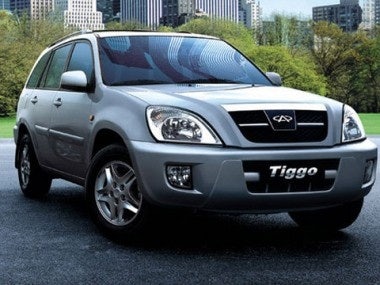Presence In Middle East/North Africa (MENA) Markets Has Increased Rapidly In Recent Years, Mainly Due To Lower-Priced Vehicles#

SUVs like the Chery Tiggo may prove very popular in the harsh climates of many MENA countries (Image: PR)
Like their counterparts in the high-tech, fashion, and wine industries, Chinese automakers have made a strong push in the last few years to move up the value chain, with the ultimate goal being increased exports not only to emerging countries, but also developed markets like the U.S., the eurozone and Japan. While this has been, to date, easier said than done, with consumer skepticism and more stringent safety standards slowing the meaningful entrance of Chinese brands in established markets, Chinese automakers have found modest, but growing success in places like Latin America and the Middle East/North Africa (MENA) region.
With exports of Chinese vehicles expected to surpass one million units by next year, and Chinese brands working to increase local dealer and distribution networks overseas, the presence of Chinese automakers in the Middle East and North Africa, in particular, may become far more pronounced in the next five years.
Though China became a net exporter of automobiles in 2005, efforts to introduce higher-priced, premium lines in international markets have so far seen mixed success. According to Arab News, Chery -- known for low-priced models like its QQ -- recently launched four models in the Saudi Arabia market, the A5, Eastar, V5 and the Tiggo SUV, in the hopes of competing (on price) with established brands like BMW and Mercedes-Benz. While Chery will, more likely, be competing head-to-head with other lower-end brands like India's Tata for the time being, MENA demand for vehicles (especially pickups) that can stand up to harsh desert climates should still present plenty of opportunities for Chinese automakers from the very low to the higher-end segments.
From Arab News:
For years, consumers in the MENA region have become used to buying small and low-tech made-in-China commodities. But now, they are showing increasing interest in trying something bigger — China’s homegrown sedans. Within a short span of time, cars with Chinese brands are quickly leaving their own marks on streets in the MENA region, from Jordan to Egypt, which had been traditionally dominated by cars from Europe, Japan and South Korea.
Like many other made-in-China goods, Chinese brand cars have a formidable edge over their competitors, which are priced low but boast high quality, said Mohamed Sulaiman, a member of the Jeddah Chamber of Commerce and Industry who bought a Chery sedan. “I chose the car because of its competitive price, soft installment payment and fuel economy.” In fact, Chery Automobile Co. Ltd., one of the biggest homegrown carmakers in China, began to sell its cars only a few years ago. Its sales volume is steadily increasing now. When the car was introduced, the local dealers found it difficult to convince consumers to buy it.
“But now, this and other Chinese cars are growing stronger and more competitive. People are willing to purchase these cars for their quality and prices,” one of them said, adding that these cars give consumers freedom of movement and choice in addition to specifications, which meet demands of low-income brackets. “We are optimistic that our sales figures will be more impressive in the years to come.”
While we'd take some of these quotes with a grain of salt, the numbers do show that exports should grow steadily to MENA markets in coming years. Though Chinese automakers will surely be promoting their premium lines more strongly, also look for these companies to set up more local production facilities abroad. Chery currently operates a factory in Egypt, with an annual production capacity of 25,000 units, and the company has announced that it plans to set up a production line in Iran as well.